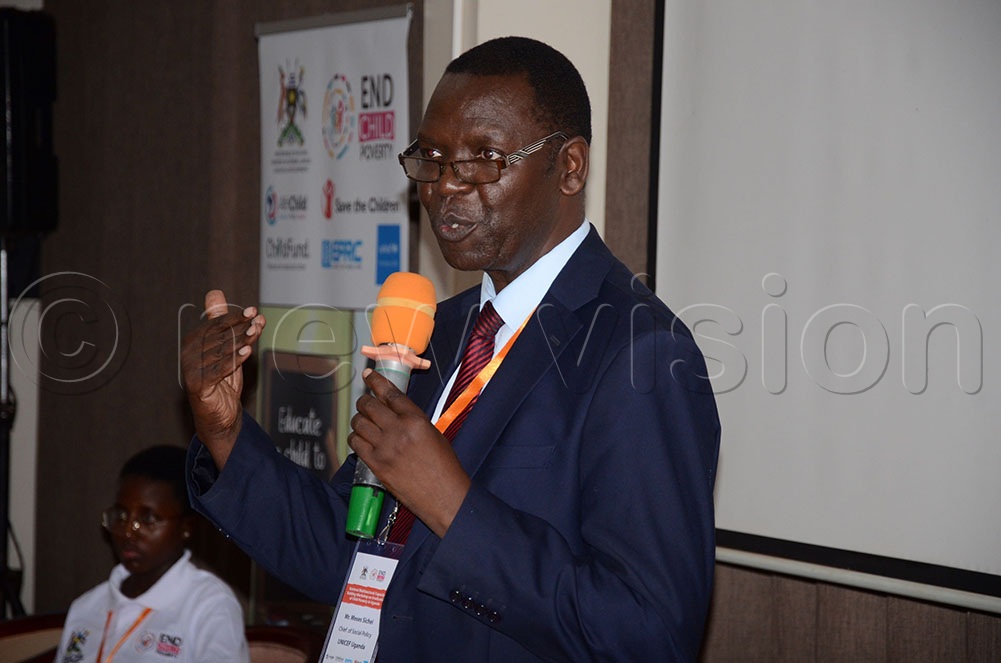Uganda told to strengthen safety nets as poverty threatens SDG targets
Kibenge reaffirmed government commitment through the recently launched National Development Plan IV and existing social protection frameworks, stressing the importance of child-centred interventions, family-focused approaches, and stronger safety nets.
Dr. Moses Sichei (C), the Chief of Social Policy at UNICEF Uganda, with pupils and students from various schools who participated in the Children's Panel Discussion during the National workshop on Eradication of Child Poverty at the Source of the Nile Hotel in Jinja City on Friday. (Credit: Donald Kiirya)
Uganda has marked the delayed commemoration of the International Day for the Eradication of Poverty, with the permanent secretary of the Ministry of Gender, Labour and Social Development emphasising that poverty remains a critical barrier to the achievement of Sustainable Development Goals.
The International Day for the Eradication of Poverty, globally recognised on October 17, was commemorated on November 14, 2025, during the closing session of a five-day National Capacity-Building Workshop on ending child poverty.
Held at Source of the Nile Hotel in Jinja city, the event brought together government officials, UNICEF, civil society organisations, faith-based institutions, and children’s representatives to address the persistent challenge of multi-dimensional child poverty.
According to Kibenge, “Approximately 38.4% of children under 18 years experience deprivations in health, education, and living standards,” citing findings from the Uganda Demographic and Health Survey 2021.
He highlighted additional statistics from the workshop, noting that 12% of children are stunted due to chronic malnutrition, 25% of children aged 6 to 17 are out of school with higher rates in marginalised communities, and nearly 30% of households with children face food insecurity.
Kibenge reaffirmed government commitment through the recently launched National Development Plan IV and existing social protection frameworks, stressing the importance of child-centred interventions, family-focused approaches, and stronger safety nets.
He also called for coordinated multi-sectoral collaboration involving education, health, agriculture, local government, security, the private sector, religious institutions, and communities.
Dr Moses Sichei, chief of social policy at UNICEF Uganda, delivered remarks aligned with this year’s global theme, “Ending Social and Institutional Maltreatment by Ensuring Respect and Effective Support for Families.”
Dr Sichei described how institutional practices, including intrusive surveillance, humiliating treatment at police stations and hospitals, under-resourced services, and punitive conditionalities, deepen fear, shame and exclusion among families living in poverty. He said, “Poverty is not only material hardship; it is also about how institutions treat people in moments of vulnerability.”
He called for three systemic shifts: moving from control to care, from surveillance to genuine support, and from top-down to inclusive, family co-created solutions.
Dr. Moses Sichei, the Chief of Social Policy at UNICEF Uganda addressing participants during the National workshop on Eradication of Child Poverty at the Source of the Nile Hotel in Jinja City on Friday. (Credit: Donald Kiirya)
Dr Sichei praised Uganda’s launch of the National Coalition on Child Poverty and the new Operational Framework for Social Care and Support Systems, while urging continued expansion of well-funded social protection measures, transformed institutional practices, and stronger child-focused and data-driven investments.
Representing the permanent secretary earlier, Fred Ngabirano, commissioner for youth and children affairs at the Ministry of Gender, Labour and Social Development, celebrated incremental progress.
He noted that Uganda ranked first globally in child-protection policy formulation in 2022 and was the first country to establish a National Coalition on Child Poverty.
He added, “We are good at policy; now we must match it with implementation and celebrate progress already made in maternal mortality, education, and health indicators.”
Contributions from the Office of the Prime Minister, represented by Christopher Magezi, and Dr Peter Nareeba from Makerere University underscored ongoing government coordination mechanisms, performance tracking systems for local governments, and updates to the National Risk Atlas.
These efforts support families affected by natural disasters through permanent housing, livelihood programmes, and continued education for children.
Participants, including children who shared personal experiences of poverty and institutional mistreatment, enriched discussions and reinforced the importance of centring the voices of those most affected in the development of policies.
In closing, both the permanent secretary and UNICEF reiterated a unified call to action: sustained collaboration across all sectors is essential to break the intergenerational cycle of poverty and build a Uganda where every child can thrive with dignity by 2040 and beyond.
UNICEF, along with partners including AfriChild, Child Fund, EPRC and Save the Children, was recognised and thanked for funding and facilitating the capacity-building initiative.
The workshop concluded with renewed commitments to evidence-based advocacy, mindset change, enhanced data collection, strengthened child-protection systems, and inclusive governance aimed at ensuring that no child is left behind.
The event also featured presentations such as poems by pupils and students from various schools, conveying messages that called for adequate clothing and basic school supplies, including school fees and essential equipment. Participants received certificates of participation from the organisers.